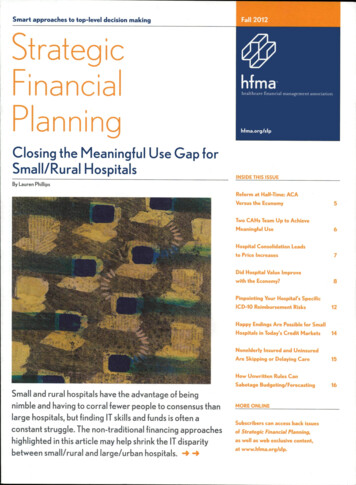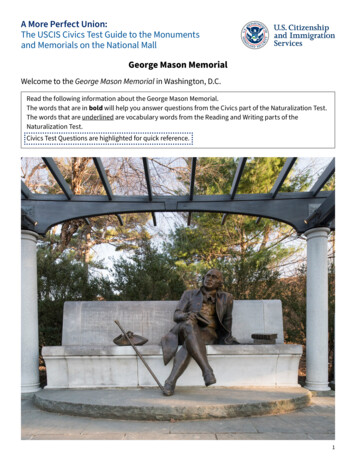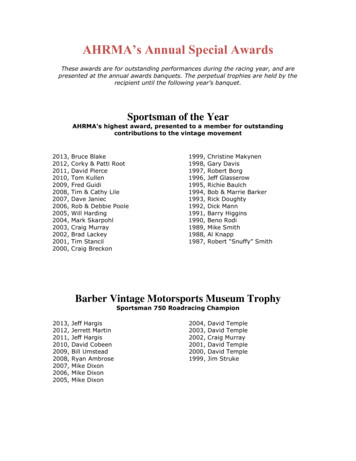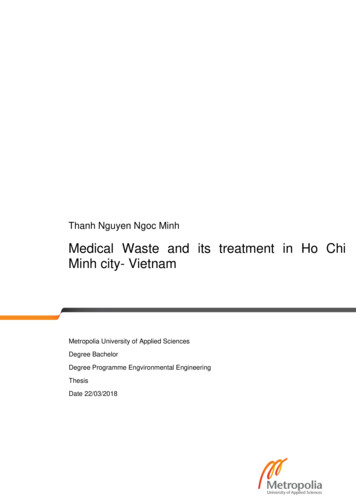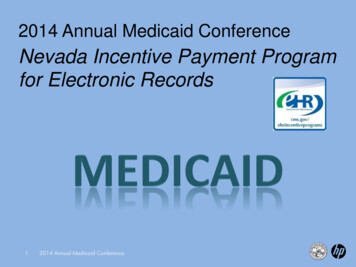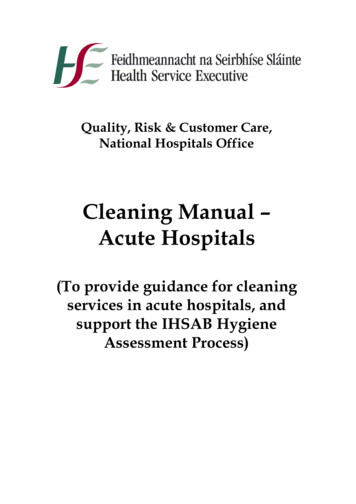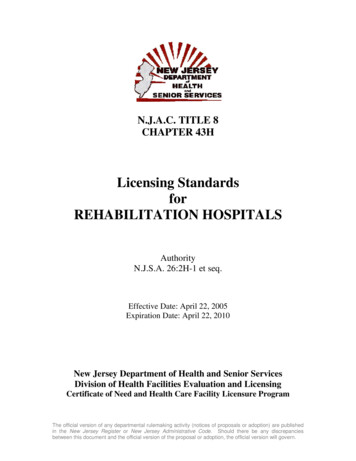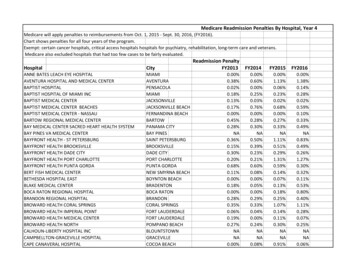
Transcription
St George’s UniversityHospitals NHS FoundationTrustMedicines FormularyDate Updated: February 2020Drug & Therapeutics CommitteeSt George’s University Hospitals NHS Foundation Trust
St George’s University Hospitals NHS Foundation TrustMedicines FormularyTable of Contents – by BNF SectionFormulary GuideChapter 1: Gastro-intestinal System1.1 Dyspepsia and GI Reflux Disease1.2 Antispasmodic1.3 Antisecretory Drugs1.4 Acute Diarrhoea1.5 Chronic Bowel Disorders1.6 Laxatives1.7 Local Preparations for Anal and RectalDisorders1.9 Drugs Affecting Intestinal SecretionsChapter 2: Cardiovascular System2.1 Positive Inotropic Drugs2.2 Diuretics2.3 Anti-arrhythmic Drugs2.4 Beta Adrenoreceptor Blocking Drugs2.5 Hypertension and Heart Failure2.6 Nitrates, Calcium Channel Blockers andRelated Drugs2.7 Sympathomimetics2.8 Anticoagulants2.9 Antiplatelet Drugs2.10 Fibrolytic Drugs2.11 Antifibrinolytic Drugs and Haemostatics2.12 Lipid Regulating Drugs2.13 Local Sclerosants2.14 OtherChapter 3: Respiratory System3.1 Bronchodilators3.2 Corticosteroids3.3 Cromoglicate and Leukotriene receptor3.4 Antihistamines3.5 Respiratory stimulants and pulmonarysurfactants3.7 Mucolytics3.8 Aromatic Inhalations3.9 Cough Preparations3.10 Systemic Nasal Decongestants4.7 Analgesics4.8 Antiepileptic Drugs4.9 Drugs used in parkinsonism and relateddisorders4.10 Drugs used in Substance Dependence4.11 Drugs for DementiaChapter 5: Infections5.1 Antibacterial Drugs5.2 Antifungal Drugs5.3 Antiviral Drugs5.4 Antiprotozoal Drugs5.5 AnthelminticsChapter 6: Endocrine System6.1 Drugs used in Diabetes6.2 Thyroid and Antithyroid Drugs6.3 Corticosteroids6.4 Sex Hormones6.5 Hypothalamic and Pituitary Hormones andAnti-oestrogens6.6 Drugs affecting bone metabolism6.7 Other Endocrine DrugsChapter 7: Obstetrics, gynaecology, andurinary-tract infections7.1 Drugs used in Obstetrics7.2 Treatment of Vaginal and Vulval conditions7.3 Contraceptives7.4 Drugs for Genitor-Urinary Disorders7.5 OtherChapter 8: Malignant Disease andImmunosupporession8.1 Cytotoxic Drugs8.2 Drugs affecting the immune response8.3 Sex hormones and hormone antagonists inmalignant diseaseChapter 4: Central Nervous SystemChapter 9: Nutrition and Blood4.1 Hypnotics and Anxiolytics4.2 Drugs used in Psychoses and RelatedDisorders4.3 Antidepressant Drugs4.4 CNS Stimulants and Drugs Used forAttention Deficit Hyperactivity Disorder4.5 Anti Obesity Drugs4.6 Drugs Used in Nausea and Vertigo9.1 Anaemias and some other blood disorders9.2 Metabolic Disorders9.6 Vitamins9.9 MiscellaneousDate published: February 2020Author: Drugs & Therapeutics Committee, St George's University Hospitals NHS Foundation Trust
St George’s University Hospitals NHS Foundation TrustMedicines FormularyChapter 10: Musculoskeletal and JointDiseases10.1 Drugs used in Rheumatic Diseases and Gout10.2 Drugs used in Neuromuscular Disorders10.3 Drugs for the relief of Soft-TissueInflammation10.4 MiscellaneousChapter 11: Eye11.3 Anti-Infective Eye Preparations11.4 Corticosteriods and other anti-inflammatorypreparations11.5 Mydriatics and Cycloplegics11.6 Treatment of Glaucoma11.7 Local Anaesthetics11.8 Miscellaneous Opthalmic PreparationsChapter 12: Ear, nose, and Oropharynx12.1 Drugs acting on the Ear12.2 Drugs acting on the Nose12.3 Drugs acting on the OropharynxChapter 13: Skin13.2 Emollient and barrier preparations13.3 Topical local anaesthetics and antipruritics13.4 Topical Corticosteroids13.5 Preparations for eczema and psoriasis13.6 Acne and rosacea13.7 Preparations for warts and calluses13.8 Sunscreens and camouflages13.9 Shampoos and other preparations for scalpand hair conditions13.10 Anti-infective Skin Preparations13.11 Skin cleansers, antiseptics, and preparationsfor promotion of wound healingChapter 15: Anaesthesia15.1 General Anaesthesia15.2 Local anaesthesiaChapter 16: Imaging16.1 Contrast Media16.2 Prophylaxis in Contrast Media16.3 MiscellaneousAppendix 5 Wound management productsand elasticated garments5.3 Antimicrobial DressingsDate published: February 2020Author: Drugs & Therapeutics Committee, St George's University Hospitals NHS Foundation Trust
St George’s University Hospitals NHS Foundation TrustMedicines FormularyWhat is a Medicines formulary?A Medicines formulary is a continually updated list of medications and related information, representingthe clinical judgement of physicians and pharmacists and other health care professionals, used in thetreatment and/or diagnosis of disease and promotion of health. It should be evidence based, reflectinglocal and national guidelines, and cost effective to serve the health interests of the local population.The aim of developing a formulary for St Georges Healthcare NHS Trust is to inform the hospitalprescribers of the medicines available in the hospital and, wherever available, guidance on how thesemedicines should be prescribed.Whilst some medicines are for use in hospital, a close liaison between the Drugs and TherapeuticsCommittee (DTC) and Primary Care ensures that the patient receives a seamless delivery of medicineson leaving the hospital.Names of medicinesMedicines are listed by their generic names arranged according to British National Formulary (BNF)sections. However, brand names are used when prescribing by brand name is desirable e.g. formodified-release preparations and combination medicines.Adherence to the medicines formularyMedicines listed in the formulary have been selected following comprehensive research and discussion.Adherence to the formulary, for both inpatients and outpatients, is essential in the best interest of thepatients and will ensure consistency of prescribing in hospital and in the community.Directorates will be informed of their prescribing patterns.Non-formulary medicinesPrescribing of non-formulary drugs leads to delays in treatment. These drugs will only be supplied wherea case is established for exception in discussion with approval from the relevant Senior PharmacyManager and submission of a Non-Formulary Form.Unlicensed medicinesMedicines without a UK product license are not listed in the BNF and therefore not automaticallyincluded in this formulary unless discussed specifically by the DTC. These medicines may be requestedby a Consultant by completing an Unlicensed Unlicensed Medicines Patient Specific Approval Form toconfirm that he/she takes the responsibility for prescribing such a medicine.Application to include medicines on the formularyRequests to include medicines on to the Formulary will be considered by the DTC. Requests by theprescribers (Medical & Non-medical) should be made by completing the DTC Application Form or theDTC NICE Consortia Approved Drugs Application Form. Dates for submission and meeting dates can befound on the relevant forms on the DTC Committee section on the Pharmacy Intranet Page.Date published: February 2020Author: Drugs & Therapeutics Committee, St George's University Hospitals NHS Foundation Trust
St George’s University Hospitals NHS Foundation TrustMedicines FormularyNICE Technology AppraisalsDrugs subject to a NICE Technology Appraisal (TA) require an application to the DTC committee inorder to agree a local prescribing protocol for that drug. Please use the NICE TA Application Form whichcan be found on the DTC Committee section on the Pharmacy Intranet Page.While the local prescribing protocol is being agreed medicines subject to a NICE TA will be madeavailable for prescribing, however, they will require approval by a Senior Pharmacy Manager prior tosupply using a Non-Formulary form.FeedbackPlease direct all feedback to formulary@stgeorges.nhs.ukDate published: February 2020Author: Drugs & Therapeutics Committee, St George's University Hospitals NHS Foundation Trust
St George’s University Hospitals NHS Foundation TrustMedicines FormularyChapter 1: Gastro-intestinal Disease1.1 Dyspepsia and GI Reflux DiseaseFormulary ItemStrength / FormRestrictions and/orAdviceArrangements forShared CareHigh sodium able for initiationand continuation byprimary careLow sodium content(0.92mmol persachet)Suitable for initiationand continuation byprimary careHigh sodium content(6mmol/10ml)Suitable for initiationand continuation byprimary careDocuments andLinks (onlyavailable to StGeorge’s staff)1.1.1 AntacidsGaviscon AdvanceGaviscon InfantMagnesiumtrisilicatesuspension BP Sugar-free tablets;sugar-freesuspension (sodiumalginate 500mg andpotassiumbicarbonate 100mgper tablet or 5mlsuspension)Sugar-free oralpowder (sodiumalginate 225mg,magnesium alginate87.5mg, withcolloidal silica andmannitol per sachet)5% (magnesiumtrisilicate 500mg,light magnesiumcarbonate 500mg &sodium bicarbonate500mg per 10ml)Date published: February 2020Author: Drugs & Therapeutics Committee, St George's University Hospitals NHS Foundation Trust
St George’s University Hospitals NHS Foundation TrustMedicines Formulary1.2 AntispasmodicsFormulary ItemStrength / FormRestrictions and/orAdviceArrangements forShared CareDocuments andLinks (onlyavailable to StGeorge’s staff)AntispasmodicsDicycloverinehydrochloride10mg tabletHyoscinebutylbromide10mg tablet; 20mgin 1ml injectionPropanthelinebromide15mg tabletSuitable for initiationand continuation byPrimary CareSuitable for initiationand continuation byPrimary CareSuitable for initiationand continuation byPrimary CareOther antispasmodicsMebeverinehydrochloride135mg tabletPeppermint oil0.2ml EC capsules;0.8% v/v 50mlenema2.5 microlitres ofpeppermint oil in5mlPeppermint waterBPEnema used to relaxthe colon duringcolonoscopyIndigestion,flatulence andspasm. May beused forsymptomatic relief inirritable bowelsyndrome.10mlorally up to fourtimes a day whennecessarySuitable for initiationand continuation byPrimary CareSuitable for initiationand continuation byPrimary CareSuitable for initiationand continuation byPrimary CareMotility g tablet; 1mg in1ml suspension;30mg suppository;5mg in 1 ml injection250mg & 500mgtablets; 125mg in5ml & 250mg in 5mlsuspensions; 1ginjection10mg tablet; 5mg in5ml syrup; 10mg in2ml injectionSuitable for initiationand continuation byPrimary CareProkinetic agent[unlicensed use],motility stimulantSuitable for initiationand continuation byPrimary CareSuitable for initiationand continuation byPrimary CareDate published: February 2020Author: Drugs & Therapeutics Committee, St George's University Hospitals NHS Foundation Trust
St George’s University Hospitals NHS Foundation TrustMedicines Formulary1.3 Antisecretory DrugsFormulary ItemStrength / FormRestrictions and/orAdviceArrangements forShared CareDocuments andLinks (onlyavailable to StGeorge’s staff)H.pylori eradication – triple therapy for 7 daysOmeprazole20mg capsule20mg twice daily10mg & 20mgdispersible tablets (MUPS )Restricted topaediatric andneonatal only10mg/5ml liquidRestricted topaediatric andneonatal only (forpatients withfinebore nasogastrictubes and where omeprazole MUPSare deemedunsuitable)Dose:Neonates:700mcg/kg oncedaily up to 2.8mg/kgonce dailyChild:700mcg/kg oncedaily up to 3mg/kgonce daily(maximum 40mgdaily)1000mg twice dailyAmoxicillin500mg capsule;250mg in 5ml syrupClarithromycin500mg tablet;250mg in 5mlsuspension400mg tablets;200mg in letablets30mg tablets500mg twice dailyOnly to be used toreplace amoxicillinfor penicillin allergicpatients400mg twice dailyOnly to be used toreplace omeprazolein patients withswallowingdifficulties30mg twice dailySuitable for initiationand continuation byprimary careSuitable for initiationand continuation byprimary careSuitable for initiationand continuation byprimary careSuitable for initiationand continuation byprimary careSuitable for initiationand continuation byprimary careDate published: February 2020Author: Drugs & Therapeutics Committee, St George's University Hospitals NHS Foundation Trust
St George’s University Hospitals NHS Foundation TrustMedicines Formulary1.3.1 H2- receptor antagonistsRanitidine150 & 300mgtablets; 50mg in 2mlinjectionSuitable for initiationand continuation byprimary care1.3.3 Chelates and complexesSucralfate1g tablet; 1g in 5mlsuspensionSuitable for initiationand continuation byprimary care1.3.4 Prostaglandin analoguesMisoprostol200 microgramtabletSuitable for initiationand continuation byprimary care1.3.5 Proton pump inhibitorsOmeprazole10mg & 20mgcapsulesOmeprazoledispersible tablets (MUPS )10mg tabletRestricted topaediatrics10mg & 20mgdispersible tablets(MUPS )Restricted:GastroenterologyteamOmeprazole10mg/5ml solutionLansoprazoleorodispersibletablets15mg & 30mgtabletsLansoprazolecapsules30mg capsulesOmeprazoleEsomeprazole40mg injection10mg granulesDuring periods ofnational shortage,the aboverestrictions will belifted.Restricted topaediatrics andneonatal onlyOnly for patientswherebyOmeprazole MUPSare not suitable andhave causedblockages tonasogastric tubes.Restricted to adultpatients withswallowingdifficultiesRestricted topatients onclopidogrel whoneed to beprescribed a PPIRestricted:PaediatricsSuitable for initiationand continuation byprimary careSuitable for initiationand continuation byprimary careSuitable for initiationand continuation byprimary careSuitable for initiationand continuation byprimary careSuitable for initiationand continuation byprimary careHospital onlySuitable for initiationand continuation byprimary careDate published: February 2020Author: Drugs & Therapeutics Committee, St George's University Hospitals NHS Foundation Trust
St George’s University Hospitals NHS Foundation TrustMedicines Formulary1.4 Acute DiarrhoeaFormulary ItemStrength / FormRestrictions and/orAdviceArrangements forShared CareDocuments andLinks (onlyavailable to StGeorge’s staff)Oral rehydration Dioralyte Oralpowder8.8g sachetSt Marks OralRehydration SaltsSuitable for initiationand continuation byprimary careSuitable for initiationand continuation byprimary care1.4.2 Antimotility drugsCodeine phosphateCo-phenotrope (Lomotil )Loperamide15mg, 30mg, 60mgtablets; 25mg in 5mlsyrup2.5/0.025 tablets(2.5mgdiphenoxylatehydrochloride 25micrograms atropineper tablet)2mg capsules, andtablets; 1mg in 5mlsugar-free syrup (Imodium syrup)Suitable for initiationand continuation byprimary careSuitable for initiationand continuation byprimary careSuitable for initiationand continuation byprimary careDate published: February 2020Author: Drugs & Therapeutics Committee, St George's University Hospitals NHS Foundation Trust
St George’s University Hospitals NHS Foundation TrustMedicines Formulary1.5 Chronic Bowel DisordersFormulary ItemStrength / FormRestrictions and/orAdviceArrangements forShared CareDocuments andLinks (onlyavailable to StGeorge’s staff)1.5.1 AminosalicylatesCaution – blood disordersPatients receiving aminosalicylates should be advised to report any unexplained bleeding, bruising, purpura, sorethroat, fever or malaise that occurs during treatment. A blood count should be performed and the drug stoppedimmediately if there is suspicion of a blood dyscrasia.Balsalazide750mg capsuleRestricted to: ConsultantGastroenterologists / GastroSpRs and GastroClinical Fellows. For treatment ofmild to moderateactive ulcerativecolitis, avoidingsteroid use. Asan alternative to Asacol or if noresponse to Asacol .(Balsalazide ismore effectiveand bettertolerated thanmesalazine [Asacol ] inacute ulcerativecolitis). Substitute forolsalazine whichis poorlytolerated.Suitable forcontinuation byprimary careDate published: February 2020Author: Drugs & Therapeutics Committee, St George's University Hospitals NHS Foundation Trust
St George’s University Hospitals NHS Foundation TrustMedicines FormularyMesalazine Asacol :1g/dose & 2g/doseenema Pentasa :500mg MR tablets;1g MR tablets,granules 1g persachet; 1gsuppository; 1gretention enema Asacol and OctasaMR 400mg arepharmaceuticallyequivalent. Suitable forcontinuation byprimary careNew patients to beinitiated andcontinued on Octasa . Octasa :400mg MR and800mg MR tablet OlsalazineSulfasalazineSalofalk :500mgsuppositories250mg capsuleSuitable forcontinuation byprimary careSuitable forcontinuation byprimary care500mg tablet;500mg EC tablet;250mg in 5mlsuspension1.5.2 CorticosteroidsBudesonide3mg EC capsule (Budenofalk )9mg prolongedrelease tablets (Cortiment )Induction ofremission in patientswith mild to moderateactive ulcerativecolitis (UC) where 5ASA treatment is notsufficient.Suitable forinitiation andcontinuation byprimary careTreatment ofeosinophilicoesophagitis inadults older than 18years of age.Hospital Only2mg/dose rectalfoam1mg OrodispersibleTabletsHydrocortisoneacetate10% rectal foam(125mg per dose)Prednisolone1mg, 5mg & 20mgtablets;5mg soluble(paediatrics only)rectal foam 20mgper application;enema 20mg per100mlSuitable forinitiation andcontinuation byprimary careSuitable forinitiation andcontinuation byprimary careDate published: February 2020Author: Drugs & Therapeutics Committee, St George's University Hospitals NHS Foundation Trust
St George’s University Hospitals NHS Foundation TrustMedicines Formulary1.5.3 Drugs affecting the immune responseAzathioprine25mg and 50mgtablets; 250mg in5ml suspension[unlicensed]50mg in 1mlinjection; 250mg in5ml injectionCiclosporinMethotrexate2.5mg tabletTacrolimus ointmentResistant orfrequently relapsingCrohn’s disease.Dose: 2 mg/kg dailySevere acuteulcerative colitisrefractory tocorticosteroidtreatmentCrohn’s disease.Dose 15-25 mgweeklyUlcerating perianalCrohn’s disease andpyodermagangrenosum as alast-line option if allother therapies andsurgery have failedor are unsuitableSuitable forcontinuation byprimary careRestricted:GastroenterologyHospital onlyHospital onlySuitable forcontinuation byprimary careSuitable forcontinuation byprimary careCytokine modulatorsAdalimumab40mg in 0.8mlinjectionInfliximab injection100mg injectionHigh Cost DrugUse underspecialistsupervision onlyHospital onlyUse in accordancewith NICE guidancefor Crohn’s disease(NICE technologyappraisal 187) andacute exacerbationsof ulcerative colitis(NICE technologyappraisal 163)Date published: February 2020Author: Drugs & Therapeutics Committee, St George's University Hospitals NHS Foundation Trust
St George’s University Hospitals NHS Foundation TrustMedicines FormularyVedolizumab(Entyvio)300mg injectionFor the treatment ofpatients withmoderately toseverely activeCrohn's disease onlyif:- a tumour necrosisfactor-alpha inhibitorhas failed (that is, thedisease hasrespondedinadequately or haslost response totreatment)- or a tumournecrosis factor-alphainhibitor cannot betolerated or iscontraindicated.Hospital onlyFor prescription byGastroenterologyonly.Date published: February 2020Author: Drugs & Therapeutics Committee, St George's University Hospitals NHS Foundation Trust
St George’s University Hospitals NHS Foundation TrustMedicines Formulary1.6 LaxativesFormulary ItemStrength / FormRestrictions and/orAdviceArrangements forShared CareDocuments andLinks (onlyavailable to StGeorge’s staff)1.6.1 Bulk forming laxativesIspaghula husk3.5ggranules/sachet(orange flavour)Suitable for initiationand continuation byprimary care1.6.2 Stimulant laxativesBisacodyl10mg tablet, 5mg &10mg suppository;10mg in 30mlenema [unlicensed]2.74mg/ml rectalsolutionCo-danthramerDocusate sodiumGlycerolDantron/poloxamer:25/200mg &37.5/500mgcapsules; 25/200mgin 5mlsuspension;75/1000mg in 5ml strongsuspension100mg capsule;50mg in 5mlsolution; 120mgenema60mg, 1g, 2g & 4gsuppositorySenna7.5mg tablet; 7.5mgin 5ml liquidSodium picosulfate5mg in 5ml elixirSuitable for initiationand continuation byprimary carePaediatrics –management ofconstipation forpatients with ACE(antegrade enema)Restricted:Prophylaxis andtreatment ofanalgesic inducedconstipation in theterminally illSuitable for initiationand continuation byprimary careSuitable for initiationand continuation byprimary careSuitable for initiationand continuation byprimary careSuitable for initiationand continuation byprimary careSuitable for initiationand continuation byprimary care1.6.3 Faecal softenersArachis oil130ml enemaContains peanut oilSuitable for initiationand continuation byprimary care1.6.4 Osmotic laxativesLactulose3.35g in 5ml oralsolutionSuitable for initiationand continuation byprimary careDate published: February 2020Author: Drugs & Therapeutics Committee, St George's University Hospitals NHS Foundation Trust
St George’s University Hospitals NHS Foundation TrustMedicines FormularyLiquid paraffin andmagnesiumhydroxide emulsionMacrogol OralPowder(polyethyleneglycols)PhosphatesSodium citrate Mil-par (containsliquid paraffin1.25ml in 5ml andmagensiumhydroside mixtureBP 3.75ml in 5ml) Laxido sachets(adults) & Movicol Paediatric Plainsachets Cleen ready to UseEnema(contains sodiumacid phosphate21.4g, sodiumphosphate9.4g/118ml) Micralax Microenema (containssodium citrate450mg, sodiumalkylsulphoacetate45mg, glycerol625mg in 5ml)Suitable for initiationand continuation byprimary careSuitable for initiationand continuation byprimary careSuitable for initiationand continuation byprimary careSuitable for initiationand continuation byprimary care1.6.5 Bowel cleansing preparationsCitraFleet containing:10.97g Citric acidanhydrous, 3.5gMagnesium oxidelight and 10mgSodium picosulfate10 mg sachetsMacrogolMoviprep containing:Sodiumpicosulphate withmagnesium citrateRestricted:AdultsSuitable for initiationby primary careKlean-Prep oralpowder 59g/sachetRestricted:PaediatricsSuitable for initiationand continuation byprimary careMacrogol 3350 withanhydrous sodiumsulfate, ascorbicacid, potassiumchloride, sodiumascorbate andsodium chloridesachets Picolax oralpowder10mg/sachetRestricted:AdultsSuitable for initiationand continuation byprimary careRestricted:PaediatricsSuitable for initiationand continuation byprimary care Date published: February 2020Author: Drugs & Therapeutics Committee, St George's University Hospitals NHS Foundation Trust
St George’s University Hospitals NHS Foundation TrustMedicines Formulary1.6.6 Peripheral opioid-receptor antagonistsMethylnaltrexone12mg in 0.6ml vialNaloxegol12.5 and 25mgtabletsPalliativeCareTeam only for thetreatment of opioidinduced constipationin advanced illnesspatients who arereceiving palliativecarewhereresponse to usuallaxative therapy hasnot been sufficient.For the treatment ion has notadequatelyrespondedtotreatment with atleast2laxativeclasses for at least 4days during the prior2 weeks.Hospital OnlySuitable forcontinuation byprimary nt,andchronic pain teamsonly1.6.7 5HT4 – receptor agonists and guanylate cyclase-C receptor agonistsPrucalopride1mg, 2mg tabletsRecommended forthe treatment ofchronic constipationin women for whomtreatment with atleast 2 drecommendeddoses for at least 6months, has failedandinvasivetreatment is beingconsidered.Suitable for initiationand continuation byprimary careDate published: February 2020Author: Drugs & Therapeutics Committee, St George's University Hospitals NHS Foundation Trust
St George’s University Hospitals NHS Foundation TrustMedicines FormularyLinaclotide290mcg capsulesSymptomatictreatmentofmoderate-to- severeirritablebowelsyndromewithconstipation (IBS-C)in adults.Initiation bysecondary care;suitable forcontinuation byprimary careSee protocol forinitiation pathway.Restricted:Consultantgastroenterologist orcolorectal surgeonsDate published: February 2020Author: Drugs & Therapeutics Committee, St George's University Hospitals NHS Foundation Trust
St George’s University Hospitals NHS Foundation TrustMedicines Formulary1.7 Local Preparations for Anal and Rectal DisordersFormulary ItemStrength / FormRestrictions and/orAdviceArrangements forShared CareDocuments andLinks (onlyavailable to StGeorge’s staff)1.7.1 Soothing haemorrhoidal preparations AnusolCream 23g;ointment 25g;suppositoriesSuitable for initiationand continuation byprimary care(zinc oxide, bismuthoxide, bismuthsubgallate, balsamperu)1.7.2 Compound haemorrhoidal preparations with corticosteroidsAnusol HC Ointment 30g(benzoyl benzoate1.25%, bismuthoxide 0.875%,bismuth subgallate2.25%,hydrocortisone0.25%, peru balsam1.875%, zinc oxide10.75%)Suitable for initiationand continuation byprimary careSuppositories(benzoyl benzoate33mg, bismuthoxide 24mg,bismuth subgallate59mg,hydrocortisoneacetate 10mg, perubalsam 49mg, zincoxide 296mg)1.7.3 Rectal sclerosantsPhenol in Oil5% Injection 5mlHospital only1.7.4 Management of anal fissuresDiltiazem2% cream[Unlicensed Special]Glyceryl trinitrate0.4% ointment (Rectogesic )nd2 line treatment ofanal fissures inpatients who areunable to tolerateheadache with GTNst1 line treatment ofanal fissuresSuitable for initiationand continuation byprimary careSuitable for initiationand continuation byprimary careDo not confuse withhigher strengths ofGTN ointment usedto treat anginaDate published: February 2020Author: Drugs & Therapeutics Committee, St George's University Hospitals NHS Foundation Trust
St George’s University Hospitals NHS Foundation TrustMedicines Formulary1.9 Drugs Affecting Intestinal SecretionsFormulary ItemStrength / FormRestrictions and/orAdviceArrangements forShared CareDocuments andLinks (onlyavailable to StGeorge’s staff)1.9.1 Drugs affecting biliary composition and flowObeticholic acid5mg, 10mg tabletsUrsodeoxycholicacid150mg tablet;250mg capsule;250mg in 5mlsuspensionRestricted:Treatment ofPrimary biliarycholangitisNICE TA(443) : As an adjuncttreatment forpatients with aninadequateresponse toursodeoxycholicacid or asmonotherapy inpatients unableto tolerateursodeoxycholicacid For prescriptionby consultanthepatologistsonly Ursofalksuspension is sugarfreeHospital OnlySuitable for initiationand continuation byprimary care1.9.2 Bile acid sequestrantsColestyramine4g sachet (Questran )Suitable for initiationand continuation byprimary care1.9.4 PancreatinCreon 10,000Creon 25,000Creon 40,000Capsule(protease 600units,lipase 10,000units,amylase 800units)Capsule(protease1,000units, ase1,600units, lipase40,000units,amylase25,000units)Pork pancreatinSuitable for initiationand continuation byprimary carePork pancreatinSuitable for initiationand continuation byprimary carePork pancreatinSuitable for initiationand continuation byprimary careDate published: February 2020Author: Drugs & Therapeutics Committee, St George's University Hospitals NHS Foundation Trust
St George’s University Hospitals NHS Foundation TrustMedicines FormularyPancrex VPancrex V 125Pancrex V ForteCapsule(protease 430units,lipase 8,000units,amylase 9,000units)EC tablet(protease 110untis,lipase 1,900units,amylase 1,700units)Capsule(protease 160units,lipase 2,950units,amylase 3,300units)EC tablet(protease 330units,lipase 5,600units,amylase30,000units)Pork pancreatinSuitable for initiationand continuation byprimary carePork pancreatinSuitable for initiationand continuation byprimary carePork pancreatinSuitable for initiationand continuation byprimary careDate published: February 2020Author: Drugs & Therapeutics Committee, St George's University Hospitals NHS Foundation Trust
St George’s University Hospitals NHS Foundation TrustMedicines FormularyChapter 2: Cardiovascular System2.1 Positive Inotropic DrugsFormulary ItemStrength / FormRestrictions and/orAdviceArrangements forShared CareDocuments andLinks (onlyavailable to StGeorge’s staff)2.1.1 Cardiac glycosidesDigoxinDigoxin immune fab (Digifab )62.5microgram,125microgram &250 microgramtablets;50microgram per mlelixir; 500microgramin 2ml injection40mg vialSuitable for initiationand continuation byprimary careFor the treatment ofdigoxin toxicity for useaccording to theSmPC, the NationalPoisons InformationService and the Toxbase DatabaseHospital only2.1.2 Phosphodiesterase inhibitorsMilrinone10mg in 10mlinjectionHospital onlyDate published: February 2020Author: Drugs & Therapeutics Committee, St George's University Hospitals NHS Foundation Trust
St George’s University Hospitals NHS Foundation TrustMedicines Formulary2.2 DiureticsFormulary ItemStrength / FormRestrictions and/orAdviceArrangements forShared CareDocuments andLinks (onlyavailable to StGeorge’s staff)2.2.1 Thiazides and related diureticsBendroflumethiazide2.5mg & 5mg tabletsIndapamide2.5mg tabletMetolazone5mg tabletFor the treatment ofhypertensionaccording to NICEguidelines.UnlicensedMedicineSuitable for initiationand continuation byprimary careSuitable for initiationand continuation byprimary careSuitable for initiationand continuation byprimary care2.2.2 Loop diureticsBumetanideFurosemide1mg & 5mg tablets;1mg in 5ml liquid (Burinex sugarfree); 2mg in 4mlinjection20mg, 40mg &500mg tablets;40mg in 5ml liquid(Rosemont sugarfree); 20mg in 2mlinjection; 50mg in50ml injection;250mg in 5mlinjectionSuitable for initiationand continuation byprimary careSuitable for initiationand continuation byprimary care2.2.3 Potassium-sparing diuretics and aldosterone antagonistsAmiloride5mg tabletEplerenone25mg tabletSpironolactone25mg & 100mgtablets; 50mg in 5mlsuspension(Rosemont sugarfree)Restricted use:To be initiated bycardiology onlySuitable for initiationand continuation byprimary careSuitable forcontinuation byprimary careSuitable for initiationand continuation byprimary care2.2.4 Potassium-sparing diuretics with other diureticsCo-amilofruse2.5/20mg tablet;5/40mg tabletContains amiloride& furosemideCo-amilozide5/50mg tabletContains amiloride&hydrochlorothiazideSuitable for initiationand continuation byprimary careSuitable for initiationand continuation byprimary care2.2.5 Osmotic diureticsMannitol10% injection; 20%injectionHospital only2.2.7 Carbonic anhydrase inhibitorsDate published: February 2020Author: Drugs & Therapeutics Committee, St George's University Hospitals NHS Foundation Trust
St George’s University Hospitals NHS Foundation TrustMedicines FormularyAcetazolamide250mg t
St George's University Hospitals NHS Foundation Trust Medicines Formulary Date published: February 2020 Author: Drugs & Therapeutics Committee, St George's University Hospitals NHS Foundation Trust Table of Contents - by BNF Section Formulary Guide Chapter 1: Gastro-intestinal System 1.1 Dyspepsia and GI Reflux Disease 1.2 Antispasmodic
